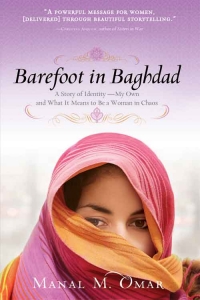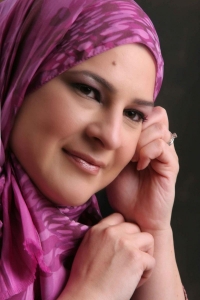Barefoot in Baghdad, By Manal M. Omar (Sourcebooks, Naperville, Illinois, 2010, 242 pages.)
 Book Review by Dennis Moore
Book Review by Dennis Moore
Barefoot in Baghdad is a Muslim American Woman’s Story of Struggle, Sisterhood, and Love in the Chaos of Iraq
July 29, 2010 (San Diego) -- Manal M. Omar, author of Barefoot in Baghdad, an international aid worker from an Arab and Muslim heritage, has provided valuable first-hand insights into events a world away following the 9/11 World Trade Center disaster. One of the book's major characters is now a prominent member of San Diego's Iraqi community.
Omar's book does not try to persuade opinions about the war. Rather, it gives a poignant perspective into how men and particularly, women attempt to go on with their lives amid the ensuing tragedy of war.
 Her book also provides a landscape of emotions and love between men and women in a war-torn environment. She uses a Charles Dickens’ analogy in her description of Baghdad: “It was the best of times, it was the worst of times.” The best of times could be Omar stating, “I enrolled in the prestigious Hunting Club in Mansour and went swimming every Tuesday and played Bingo every Friday night.” The worst of times included harrowing close calls with checkpoints and roadside bombs, as well as poignant losses of people she came to know and love.
Her book also provides a landscape of emotions and love between men and women in a war-torn environment. She uses a Charles Dickens’ analogy in her description of Baghdad: “It was the best of times, it was the worst of times.” The best of times could be Omar stating, “I enrolled in the prestigious Hunting Club in Mansour and went swimming every Tuesday and played Bingo every Friday night.” The worst of times included harrowing close calls with checkpoints and roadside bombs, as well as poignant losses of people she came to know and love.
The author, an American born in the Middle East, was able to use her unique vantage point to form an eyewitness account of events in Iraq after 9/11. To an extent, Barefoot in Baghdad is a love story, but to a larger extent, it is a story of a class society where women are expected to live and behave a certain way, according to local and historic customs. Some of those customs were “honor killings.”
Barefoot in Baghdad takes its title from a popular Iraqi-Turkman proverb that says, “Walk barefoot and the thorns will hurt you.” According to the author, it is often used as a warning to those who challenge societal norms. It could also be said that it is somewhat iconoclastic, or a breaker of traditions, which Omar indicated would make her journey not too easy. The author was quick to point out that she knew that she would be one of the people walking barefoot in a land scattered with thorns. This is a story of a clash of cultures, of women being ostracized for their beliefs and their unwillingness to adhere to long accepted customs.
The central characters in this book are the men and women of Iraq, and in particular, Yusuf, Fadi, and Mais, whom Omar worked closely with in her telling of heartrending stories of the women of Iraq, as they grapple with what it means to be female in a homeland that you no longer recognize.
A central character is Khanim Latif, leader of the Asuda Organization, who established one of the first Iraqi women’s shelters to house women from across the country. Her organization was the fact that her organization was one of the only shelters that would take the so-called “untouchable” cases, those cases dealing with “family honor.” Asuda would openly help young teenage girls who had been caught having premarital sex, rape victims, and women accused of adultery. One such teenage girl in this category was known as “Kalthoum.” The author admitted that she was captivated by Latif, who would intercede on behalf of Kalthoum. As a Muslim woman who had grown up in America, Latif became very instrumental to Omar in navigating through the dangers and customs of society in war-torn Iraq.
Latif’s office was stacked with photo albums of abused women. The author states that when high-level government officials denied the practice of honor crimes, Latif would pull out numerous photos of women burned alive or with gunshot wounds and silence her opposition immediately. “Honor killings happen,” Latif states in the book, “and they happen more than we would like to admit. However, they often happen because our communities have not learned to mediate around such a sensitive topic. No father wants to kill his daughter. Give him an excuse to maintain his honor in front of his tribe, and he will grab on to it.” That was the situation that the teenaged prostitute, Latif was faced with, and seems to be a central theme of the book.
Yusuf, whom the author would later marry, provided her with the strongest emotional support while she was engaged in a mission of humanitarian endeavor. Mais married and moved to England, where he is continuing graduate school. Fadi now lives in San Diego, where he is the heart of the Iraqi social scene. Yusuf and Omar have dedicated their careers to Iraq, some seven years later, remaining on the sidelines with the sensation and realization that they are not in control of their own destinies. As stated in her book, given the number of death threats Yusuf received after their wedding, they decided to live in Jordan for the first year of their marriage.
Perhaps the most poignant part of the book is when Omar and Yusuf were walking together in a romantic setting of a Dead Sea resort in Jordan, where Yusuf professed his love for Manal and desire to marry her, which was made more romantic by the garden being filled with waterfalls, wooden bridges, and exotic flowers. While in this setting, Omar would remind herself that she was “standing at the very water’s edge that prophets had walked.” Of course, this was quite a contrast between the bombs and bullets that might be falling in Baghdad.
Zainab Salbi, founder and CEO of Women For Women International, and author (with Laurie Bucklend)of the National Bestselling Book Between Two Worlds: Escape From Tyranny: Growing Up In The Shadow Of Saddam, captures the essence of this book, by stating: “Manal Omar captures the complex reality of living and working in war-torn Iraq, a reality that tells the story of love and hope in the midst of bombs and explosions.”
Barefoot in Baghdad, an aid worker’s journey through chaos with the women of Iraq, reveals the struggles of a Muslim woman raised in America to bridge two vastly different worlds. This is a must read that I highly recommend.
Dennis Moore is a member of the San Diego Writers/Editors Guild. He has written for LifeAfter50 Magazine in Pasadena, California, and the Baja Times Newspaper in Rosarito Beach, Mexico. Mr. Moore can be contacted at demoore21@sprint.blackberry.net.














Comments
Malala Yousufzai
The Oct. 9 attack on Malala Yousufzai as she was returning home from school in Pakistan's northwest horrified people inside and outside the country. At the same time, it gave hope to some that that the government would respond by intensifying its fight against the Taliban and their allies.
Gelareh Bagherzadeh
Although not about Iran, the murder mystery surrounding the death of Gelareh Bagherzadeh in Houston strikes a similar theme from this book. Bagherzadeh had an activist's streak. When Iranian presidential elections in 2009 were widely denounced as fraudulent and led to protests in Tehran and other Iranian cities in the "Green Revolution," Bagherzadeh co-founded the activist group SabzHouston and organized street rallies across the city protesting the Iranian government.
Osama Bin Laden - ABC World News With Diane Sawyer
Author Manal Omar appeared on ABC News with Diane Sawyer today to comment on the relationship of Osama Bin Laden and his three wives, particularly that of the youngest of the wives, in the aftermath of the death of Bin Laden at the hands of the United States.
SHORTAGE IN WOMEN IN IRAQ CABINET DRAWS IRE
Iraq's female lawmakers are furious that only one member of the country's new Cabinet is a woman and are demanding better representation in a government that otherwise has been praised by the international community for bringing together the country's religious sects and political parties.
Although women make up a quarter of the 325-member parliament, only two ministries were offered to women - with a female candidate refusing one of them in protest - in the 44-member Cabinet that was sworn in on Tuesday. Female lawmakers cried foul and demanded more women be appointed.
"We were shocked that there are no women in the Cabinet," said Safiyah al-Suhail, a lawmaker with Prime Minister Nouri al-Maliki's State of Law coalition, dismissing the lone female "minister without portfolio" in the government.
IRAQI FATHER SAYS HE KILLED DAUGHTER LINKED TO AL-QAEDA
Family shame, other motives may have played a part in slaying of Shahlaa al-Anbaky reported by police this past Friday in Iraq. When police came hunting for a 19-year-old woman they believed had been recruited to be a suicide bomber in a town north of Baghdad, they found she was dead: slain by her father, who told police he strangled his daughter out of shame and then cut her throat.
Akram Arastehjoo
Another author, Akram Arastehjoo, has a similar and related story to tell, as "Barefoot in Baghdad," that she wants me to help her tell.
Barefoot In Baghdad
In a related story, an an August 4th story in ECM, a survivor recalls his harrowing escape from Sadam Hussein's Secret Police Prison, where he was tortured daily for 3 months. Joseph Ziauddin, President of the East County Refugee Center, was quoted as saying he was thrown in jail and tortured because he loaned money to a friend who opposed Sadam Hussein, then President of Iraq.